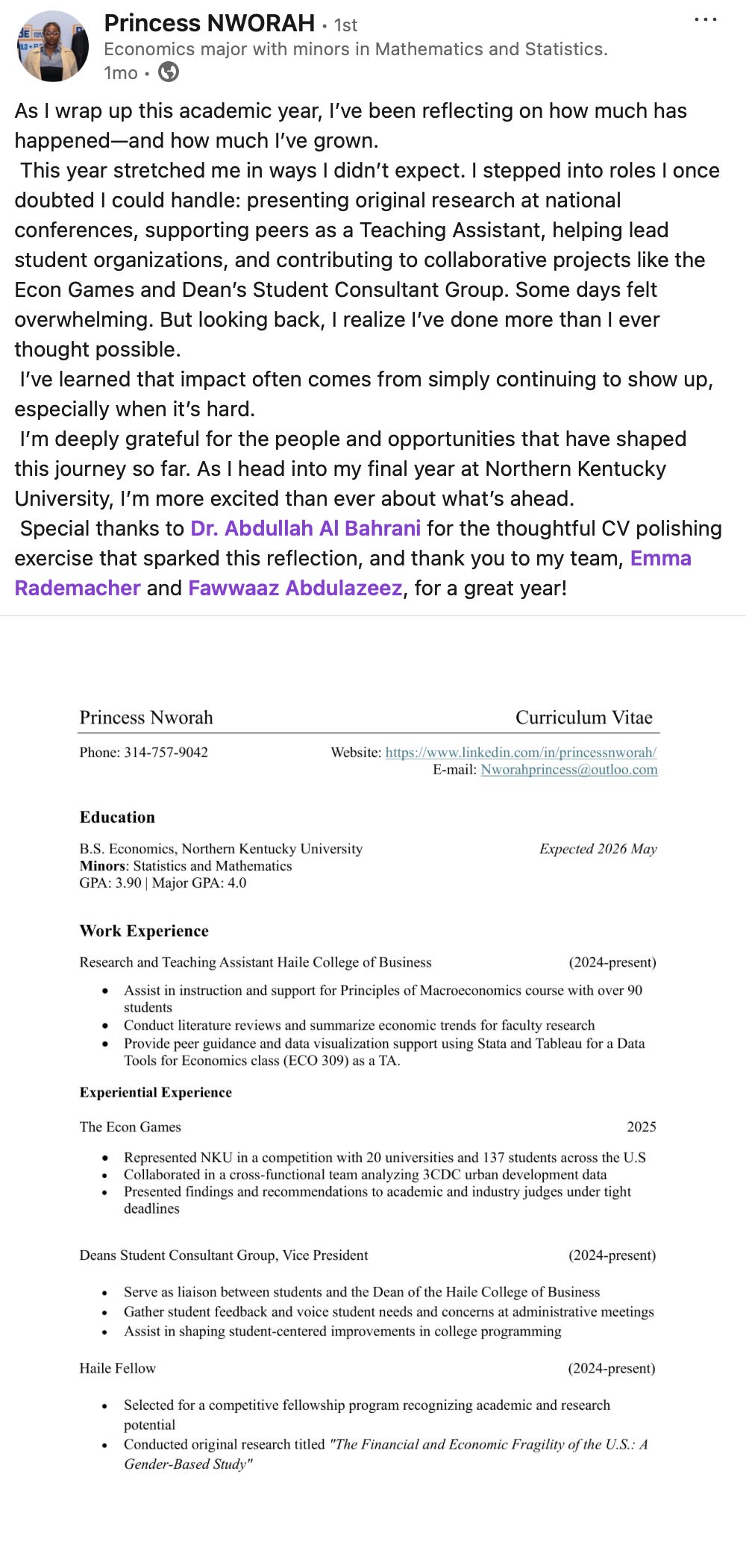Why High Achievers Update Their Resume Every Six Months
Do not make this mistake
Do not neglect your resume or CV till you need a job!
After teaching thousands of students and consulting with professionals across various industries, I've observed a practice that separates high achievers from those who plateau: they treat their CV/Resume* as a living document, not just a tool used to apply for a job.
Most professionals only update their resumes when job hunting. Do not do that! This is a reactive approach that misses the importance of regular career reflection. Today, I'm sharing why I update my CV and resume every six months, along with the professional logic behind this practice. In the pursuit of transparency, I will also share my recent version of my CV/Resume.
* For international readers: while CV and resume are used interchangeably throughout this text, usage varies by region. In the United States, 'CV' typically refers to academic documents and 'resume' to industry applications. In many other countries, including Oman, 'CV' is the standard term for what Americans refer to as a resume.
The Strategic Framework
Think of your CV/Resume as a quarterly earnings report for your career. Companies monitor performance continuously to make informed decisions. Your career deserves the same analytical rigor.
As Terry Pratchett wrote:
"If you do not know where you come from, then you don't know where you are, and if you don't know where you are, then you don't know where you're going."
Three Strategic Benefits
Growth, Recognition, and Success Amplification. When I sit down every six months to update my CV/Resume, I'm forced to catalog accomplishments I might otherwise forget. During my most recent update, I discovered that I'd given over 40 invited presentations. The invitations range from local business councils to international institutions, such as University College London (CTaLE) and Sultan Qaboos University in Oman. Without systematic tracking, I would have drastically undersold this portfolio of activity.
Keep Your Old CV/Resumes. I keep versions of my CV dating back to 2010. This enables me to track my progression from assistant professor to associate dean, as well as the projects that have led me to where I am today. Reflecting on history serves as a source of nostalgia and provides me with strategies to advance my career.
I explored similar principles of strategic career planning in Seven Career Principles from 4 AM Reflections.
Skill Gap Identification: Regular reviews reveal areas of stagnation, highlighting opportunities for improvement. If your CV/Resume looks identical after six months, that's valuable data indicating you need new challenges. One of my current students, Princess Nworah, recently shared her resume update insights on LinkedIn, demonstrating how systematic documentation reveals both growth achieved and areas needing attention.
The Implementation Process
Every December and June:
Document new achievements and responsibilities
Quantify impact with measurable outcomes
Update skills and certifications
Archive the previous version with a date stamp
Identify gaps and set six-month development goals
My Current CV: Transparency in Practice
I'm sharing my current CV to demonstrate the outcome of my 15 years of following this practice.
The Takeaway
Your CV/Resume is both a job search tool and a strategic career management tool. By updating it every six months, you transform a static document into a dynamic reflection system that enhances self-awareness and positions you for career advancement.
The practice I developed as a PhD student at the University of Kentucky has become one of my most valuable professional habits. The time investment is minimal, but the strategic insight and confidence it provides cannot be quantified.
Start your next six-month cycle today. Your future self will thank you for the clarity it creates.
What does your CV/Resume look like?
-Dr. A
Dr. Abdullah Al Bahrani is Professor of Economics and Associate Dean at Northern Kentucky University's Haile College of Business. He provides strategic economic insight to business leaders and has taught economics to thousands of students. His research focuses on financial decision-making and economic literacy.



Great idea, but now I feel incredibly neurotic for looking/updating mine every other week. I always feel like I'm forgetting something and need to go back and check to see if I did.
While updating my resume recently, I decided to move my education to the bottom of the page. Just a year and a half out of college, my professional experience is significantly more impactful on my resume than my degrees. They’re still needed (more so to jump through a hoop than anything) but I found that putting it at the top with my graduation date undersold everything I have accomplished and experienced in my short time since graduation. Updating my resume proved enlightening.